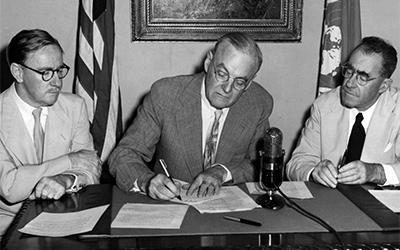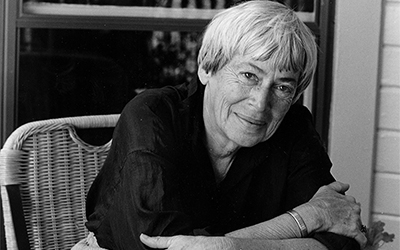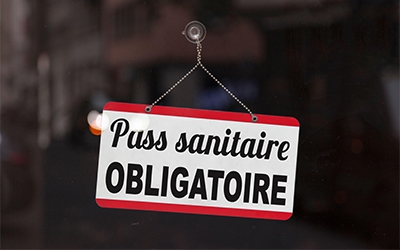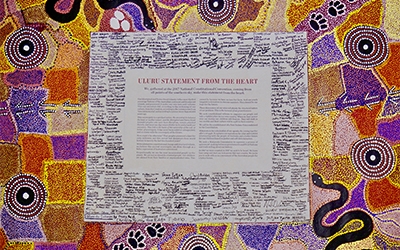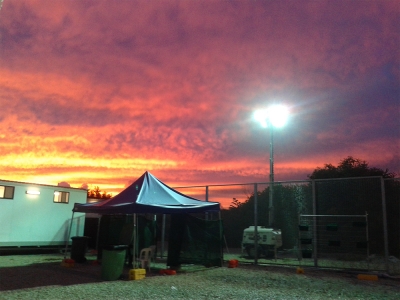Commentary
Surely it wasn’t meant to be like this. In early September, Prime Minister Scott Morrison was set to attend a lavish ceremony in Washington to mark the seventieth anniversary of the signing of the ANZUS Treaty. On the same trip, he was due to sit down in person for the first time with his US, Indian, and Japanese counterparts, fellow members of the ‘Quadrilateral Security Dialogue’, or ‘Quad’, a gathering primed to be a regional counterweight to China.
... (read more)The real estate agent told me not to bother cleaning the house. All the serious buyers would be developers, he said: they’d only knock it down. They’d cut down the row of feijoas and the Japanese maple and build all the way to the fence on three sides. And they’d go up, of course, to take advantage of the views. A corner block on the highest hill in the inner east? Tell your dad he’s laughing.
... (read more)In her 1976 essay ‘The Space Crone’, Ursula K. Le Guin imagines the highly advanced aliens of Altair landing on Earth. Politely, they seek a human being to accompany them on their long journey home so that they may ‘learn from an exemplary person the nature of the race’. As a palliative care doctor, I often ponder what constitutes an exemplary life, so my choice of Space Crone may not be a conventional one.
... (read more)I receive my first dose of the Pfizer vaccine in May, in the small town of Meaux, mostly notable for producing a luxurious variety of brie. I travel forty minutes from Paris by regional train, watching the city become the banlieue and the banlieue become the countryside, speeding towards something that for five months had felt like an impossibility. Friends in Europe had flown to New York and Kentucky to get their shots while France fumbled its way through the first months of its vaccination campaign. It would probably be quicker for me to fly back to Australia, go through hotel quarantine and get vaccinated there, I thought at the start of the year. I was very wrong.
... (read more)In the conference room the conversation is, like the clothes, ‘business casual’. For my benefit, everyone has switched from Arabic to English. Despite the linguistic shift, my new colleagues converse as fluently as before. I have arrived in Eastern Turkey with an aid organisation to support the humanitarian response in north-west Syria.
... (read more)In early 2021, the Victorian government announced the creation of the Yoo-rrook Justice Commission to investigate the harms done to Aboriginal people through colonisation. Named after the word for truth in the Wemba Wemba/Wamba Wamba langauge, Yoo-rrook will be the first exercise of its kind in an Australian jurisdiction and one of the most significant responses yet offered to the call for Voice, Treaty and Truth issued by the Aboriginal peoples of Australia in the ‘Uluru Statement from the Heart’.
... (read more)For much of her career, Gwen Harwood (1920–95) was best known for her hoaxes, pseudonyms, and literary tricks. Most notorious was the so-called Bulletin hoax in 1961, but over the years she orchestrated a number of other raids on literary targets, mainly aimed at challenging the power of poetry editors and gatekeepers. For L’Affaire Bulletin (as she sometimes called it), she submitted to that august magazine, under the pseudonym Walter Lehmann, a pair of seemingly unexceptionable sonnets on the theme of Abelard and Eloisa. Only after the poems were published did the Bulletin discover that they were acrostics; read vertically, one spelled out ‘So long Bulletin’, and the other, ‘Fuck all editors’.
... (read more)‘Your sense of permanence is perverted,’ said Holstius to Theodora Goodman in The Aunt’s Story (1948). ‘True permanence is a state of multiplication and division.’ The words are prescient, for Patrick White, who wrote them, has done rather well at dissolving into the impermanence of post-mortem obscurity. Perhaps unsurprisingly in view of the pandemic, the thirtieth anniversary of his death in 2020 left little imprint. No literary festival honoured the occasion, and no journal did a special issue. If White is looking down at us from some gumtree in the sky, he will be bathing in the lack of glory. He despised the hacks of the ‘Oz Lit’ industry as much as he loathed the ‘academic turds from Canberra’.
... (read more)People seeking asylum are off trend. As the black and brown people on boats have stopped arriving on Australia’s shores, so has our interest in them waned. In commemoration, a boat-shaped trophy sits in Prime Minister Scott Morrison’s office, inscribed with the words ‘I Stopped These’. Today, Australians seem preoccupied by the vaccine roll-out and allegations of rape in parliament. With a federal election on the horizon, people seeking asylum and refugees seem passé, a case of ‘out of sight, out of mind’.
... (read more)The Middle-East conflict is perhaps the most intractable in the world. Israelis and Palestinians have been fighting for nearly a century over the land between the Jordan River and the Mediterranean. The world has witnessed a never-ending cycle of tension and conflict, including a number of full-scale wars, with immense suffering on both sides.
... (read more)

